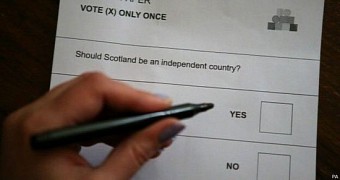Scots don’t want to divorce the United Kingdom, the results of the referendum indicate. The “no” campaign managed to attract an estimated 55 percent of voters.
“The people of Scotland have spoken. We have chosen unity over division, positive change rather than needless separation,” said Alistair Darling, leader of the Better Together group. He considers the vote a huge result for Scotland and the United Kingdom as a whole.
The leaders of Scotland’s independence campaign have also conceded defeat early on Friday morning, even though the counting continues, knowing that the end results could no longer change.
“Like thousands of others across the country, I’ve put my heart and soul into this campaign and there is a real sense of disappointment that we’ve fallen narrowly short of securing a “yes” vote,” said Nicola Sturgeon, the deputy leader of the Scottish National Party.
Even though the referendum failed and there’s not going to be another one anytime soon, the results are important in the sense of showing just how much support the separation idea has among voters. The “yes” camp may not have won this battle, but there are still 45 percent of voters who want to be separated from the United Kingdom, which is a huge number.
Alex Salmond took the time to tweet about the results and thanked those who voted “Yes” to the question about whether or not Scotland should be independent. “Well done to Glasgow, our commonwealth city, and to the people of Scotland for such a [sic] incredible support,” he wrote.
Relief in the UK
David Cameron, the British Prime Minister, said that he was delighted to see the results of the referendum. “It would have broken my heart to see the United Kingdom come to an end,” he said.
The “no” camp had some strong international supporters, including US President Barack Obama who tweeted on Wednesday on the matter. “The UK is an extraordinary partner for America and a force for good in an unstable world. I hope it remains strong, robust and united,” reads the message written by Obama and posted by the White House Twitter account.
According to partial results, about 86 percent of the Scots registered to vote went to the polls, which means that about 3.7 million people came out to vote out of 4.3 million. At the 2011 census there were 5.3 million citizens in Scotland. For this year’s referendum, the voting age was lowered to 16.
What’s Next
Scotland, as well as other regions in the UK, will likely get more powers in the near future. David Cameron has expressed his commitment towards a set of devolution movements. This means that the central government will be granting powers at a regional level, allowing territories to make legislation that is relevant to their interests.
While this may make Scottish people rejoice, especially the 1.6 million citizens that voted in favor of the country’s independence, it will be a while before they get such powers.
More specifically, Prime Minister Cameron confirms that the constitutional reforms are only going to be delivered after the general elections take place. “We have heard the voice of Scotland and now the millions of voices of England must be heard,” he said.
The government, he said, would address the issue in depth sometime soon, but he has provided no timeline.
On the other hand, this devolution that the British government promises may not be a good idea due to the implications it would have on the powers of Scottish politicians in voting for matters that concern the entire United Kingdom.
Cameron’s remarks indicated that offering Scotland more powers was dependent on the results of the next election, but they could also mean that Scottish members of the parliament would be excluded from voting on many issues specific to England.
“The last thing Scotland needs is a constitutional fix which reduces Scotland’s voice at Westminster and strengthens Tories’ grip on power,” said Owen Smith, Labour Party politician.
The general elections Cameron mentioned are scheduled for May 7, 2015, which means there are still a few more months before citizens hit the polls again.

 14 DAY TRIAL //
14 DAY TRIAL //